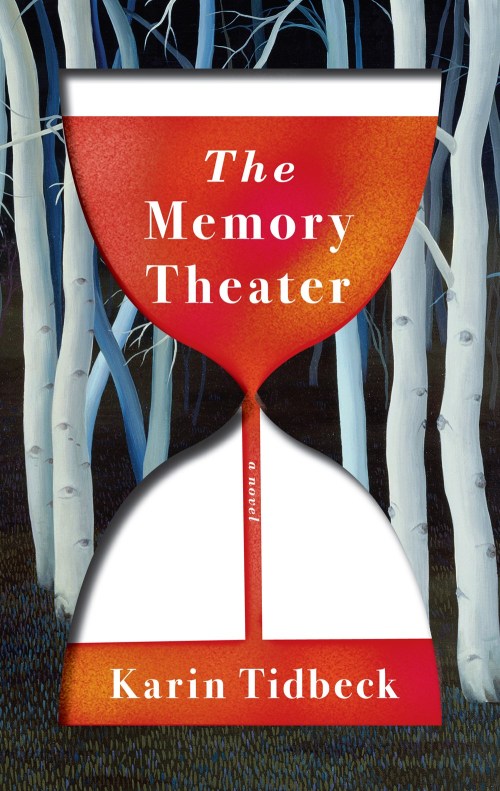[ad_1]
Karin Tidbeck is one of those writers whose work is delightfully hard to pin down to a genre—their work includes fantasy and science fiction, but slips between genres to new and stranger places. In their new novel, The Memory Theater, Tidbeck has crafted a kind of modern folktale. Inventive, surreal, at times violent, the novel has a timeless, durable quality—in its clear prose and arresting (if sometimes obscure) symbolism, it feels like a fairy tale that’s just a little too scary for the kids.
The Memory Theater begins in a kind of enchanted pocket universe, the Gardens, where a set of amoral and apparently immortal aristocrats live the same eternal day over and over. Their servants—who are cruelly abused and eventually devoured—are children kidnapped from the outside world, and have had their names taken from them. The novel revolves around three characters who leave the Gardens: Thistle, a servant boy who wants to reclaim his name and find his family; Dora, his half-human friend and protector; and Augusta, an aristocrat who is banished after she rediscovers time. Augusta sets forth on a murderous quest to return to the Gardens; Thistle and Dora eventually pursue her in search of Thistle’s name, aided by strange and magical characters they meet along the way.
Tidbeck is probably most known for their short stories, which are marked by a vivid and surreal imagery. The Memory Theater contains glimpses of previous stories like the bizarre and cannibalistic “Aunts”, while the award-winning “Augusta Prima” forms the basis for that character. The novel minimizes some of the more bizarre imagery of these stories, unifying them with a fairy-tale tonality and threading them lightly through the actual world. When the exiled Augusta reaches a city, it seems at first to be a generic fantasy setting, but is quickly revealed to be the (real) city of Uppsala, north of Stockholm. Later clues allow us to place the story early in the second World War, although the actual horrors of that time are kept at a curious remove by the magical main story. I kept thinking about Dianna Wynne Jones and Madeleine L’Engle in the way that Tidbeck situates their fantasy within and alongside the real world, and writers like Kelly Link and Helen Oyeyemi for the way it moves between dreamlike but evocative situations.
The Gardens are kind of an “Evil Narnia”, really—there’s even a morally-reversed echo of Eustace shedding his dragon-form late in the novel—and The Memory Theater abounds in magical portals and help from fantastic side-characters including interdimensional aliens, librarian-magicians, vittra (a type of spirit or gnome), and the players of the titular theater. Time and aging are major thematic concerns, and Tidbeck invests their characters with other intriguing touches. It’s not dwelt upon, but Thistle’s trauma and response to it is portrayed clearly and sympathetically, and Dora—who is half earth or mountain-spirit—feels like a kind of neurodivergent character, and it’s lovely to see her ask for and receive the kind of space and processing time that she sometimes needs.
Augusta Prima is the clear and unsalvageable villain of the story—and also, by far, the most intriguing character. Her casual and unstoppable murders are appropriate to a fairy-tale monster, but there’s a strange helplessness to her character as well. She’s quite a bit like a raging child albeit an unfortunately super-strong and magical one; her rampages are colored by her cluelessness and emphasize the evils of the aristocracy. There’s also at least a hint of gender identity exploration in Augusta’s character—her sudden preference for men’s clothing, and her later magical body-swapping that leaves her feeling her new form “like an ill-fitting suit made of flesh.” Fairy tales are famously ripe for psychoanalysis, and it’s to Tidbeck’s credit that this novel is so filled with charged but ambiguous imagery.
The Memory Theater itself is one of the stranger and more meta elements of the novel—a troupe of actors who reenact (or possibly just enact) scenes from across the multiverse. Their name is, presumably, an homage to Giulio Camillo’s Theatre of Memory—a physical “theater” (or the plans for it, at any rate) which would contain the sum of human knowledge, kind of like an occult 16th century artificial intelligence. It’s a fantastically weird idea, worth looking up. The players in Tidbeck’s Memory Theater are perhaps its spiritual successors, but they are emphatically human, even as they act out the history of the entire multiverse. Dora and Thistle’s time with them gives glimpses into other worlds and events, and provides the key to resolving their struggle with Augusta.
I don’t know that I’ve read anything else with quite the tone of The Memory Theater, although some of Neil Gaiman’s work, like Stardust, is in a similar vein. Like a lot of Gaiman’s work, Tidbeck captures the dream-logic feeling of myth and folktale, even when mixing clearly original fabulation with borrowings from older traditions. And, even at its most violent moments, The Memory Theater maintains a kind of gentleness and fascination with the world—childlike and serious at once—that put me in mind of The Ocean at the End of the Lane.
The twin quests and resulting plot of The Memory Theater aren’t exactly logical—the world is too fantastic to guess what might happen next at any point—but they are relatively straightforward, which stitches together what might otherwise sound a bit like a fix-up novel. It feels fantastic, but not arbitrary; surreal, but periodically grounded—Tidbeck strikes an intriguing balance between vivid imagery, children’s-story wonder, and mature themes, with clear and unpretentious prose and stretches of calm pastoral. It’s a strange and ultimately quite delightful tale.

[ad_2]
Source link
